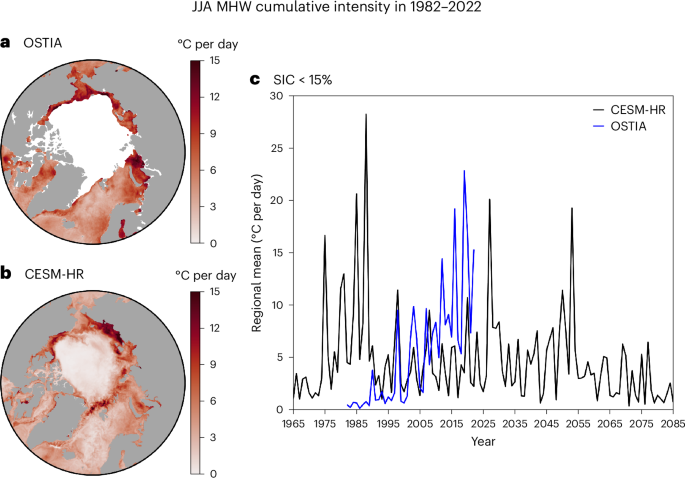The changing nature of future Arctic marine heatwaves and its potential impacts on the ecosystem
IF 29.6
1区 地球科学
Q1 ENVIRONMENTAL SCIENCES
引用次数: 0
Abstract
Marine heatwaves (MHWs), defined as extreme ocean warming episodes, have strengthened over the past decades. High-resolution climate models improve understanding of MHWs under global warming, but such events in the future Arctic are currently overlooked. In a high-resolution climate model, we find Arctic MHWs intensify on orders of magnitude during the warming twenty-first century, following sea ice retreat. However, with little sea ice coverage, strong interannual variability emerges, which could surpass the amplitude of former intensification. Furthermore, the enhancement of MHWs correlates with an order of magnitude increase in the rate of change in the temperature anomaly. Additionally, MHWs are found to be accompanied by stratification enhancement, which could surpass interannual variability of future stratification. Such extreme temperature fluctuations combined with stratification enhancement suggest major challenges for Arctic ecosystems, and may negatively impact food webs through direct physiological temperature effects, as well as indirectly through nutrient supply and taxonomic shifts. Arctic warming will decrease sea ice cover and increase the possibility of intensified marine heatwaves. Using a high-resolution model, the authors show that this intensification, combined with strengthened short-term temperature variability and enhanced stratification, could threaten the ecosystem.


未来北极海洋热浪的变化性质及其对生态系统的潜在影响
海洋热浪(MHWs)被定义为极端海洋变暖事件,在过去几十年里有所加强。高分辨率气候模型提高了对全球变暖背景下mhw的理解,但未来北极地区的此类事件目前被忽视了。在一个高分辨率的气候模型中,我们发现在21世纪变暖期间,随着海冰的退缩,北极的热浪以数量级加剧。然而,在海冰覆盖较少的情况下,出现了强烈的年际变率,其幅度可能超过以前的加剧幅度。此外,热浪的增强与温度异常的变化率增加一个数量级相关。此外,强热带气旋还伴有分层增强,可能超过未来分层的年际变化。这种极端的温度波动加上分层增强对北极生态系统提出了重大挑战,并可能通过直接的生理温度效应,以及通过营养供应和分类变化间接地对食物网产生负面影响。
本文章由计算机程序翻译,如有差异,请以英文原文为准。
求助全文
约1分钟内获得全文
求助全文
来源期刊

Nature Climate Change
ENVIRONMENTAL SCIENCES-METEOROLOGY & ATMOSPHERIC SCIENCES
CiteScore
40.30
自引率
1.60%
发文量
267
审稿时长
4-8 weeks
期刊介绍:
Nature Climate Change is dedicated to addressing the scientific challenge of understanding Earth's changing climate and its societal implications. As a monthly journal, it publishes significant and cutting-edge research on the nature, causes, and impacts of global climate change, as well as its implications for the economy, policy, and the world at large.
The journal publishes original research spanning the natural and social sciences, synthesizing interdisciplinary research to provide a comprehensive understanding of climate change. It upholds the high standards set by all Nature-branded journals, ensuring top-tier original research through a fair and rigorous review process, broad readership access, high standards of copy editing and production, rapid publication, and independence from academic societies and other vested interests.
Nature Climate Change serves as a platform for discussion among experts, publishing opinion, analysis, and review articles. It also features Research Highlights to highlight important developments in the field and original reporting from renowned science journalists in the form of feature articles.
Topics covered in the journal include adaptation, atmospheric science, ecology, economics, energy, impacts and vulnerability, mitigation, oceanography, policy, sociology, and sustainability, among others.
 求助内容:
求助内容: 应助结果提醒方式:
应助结果提醒方式:


